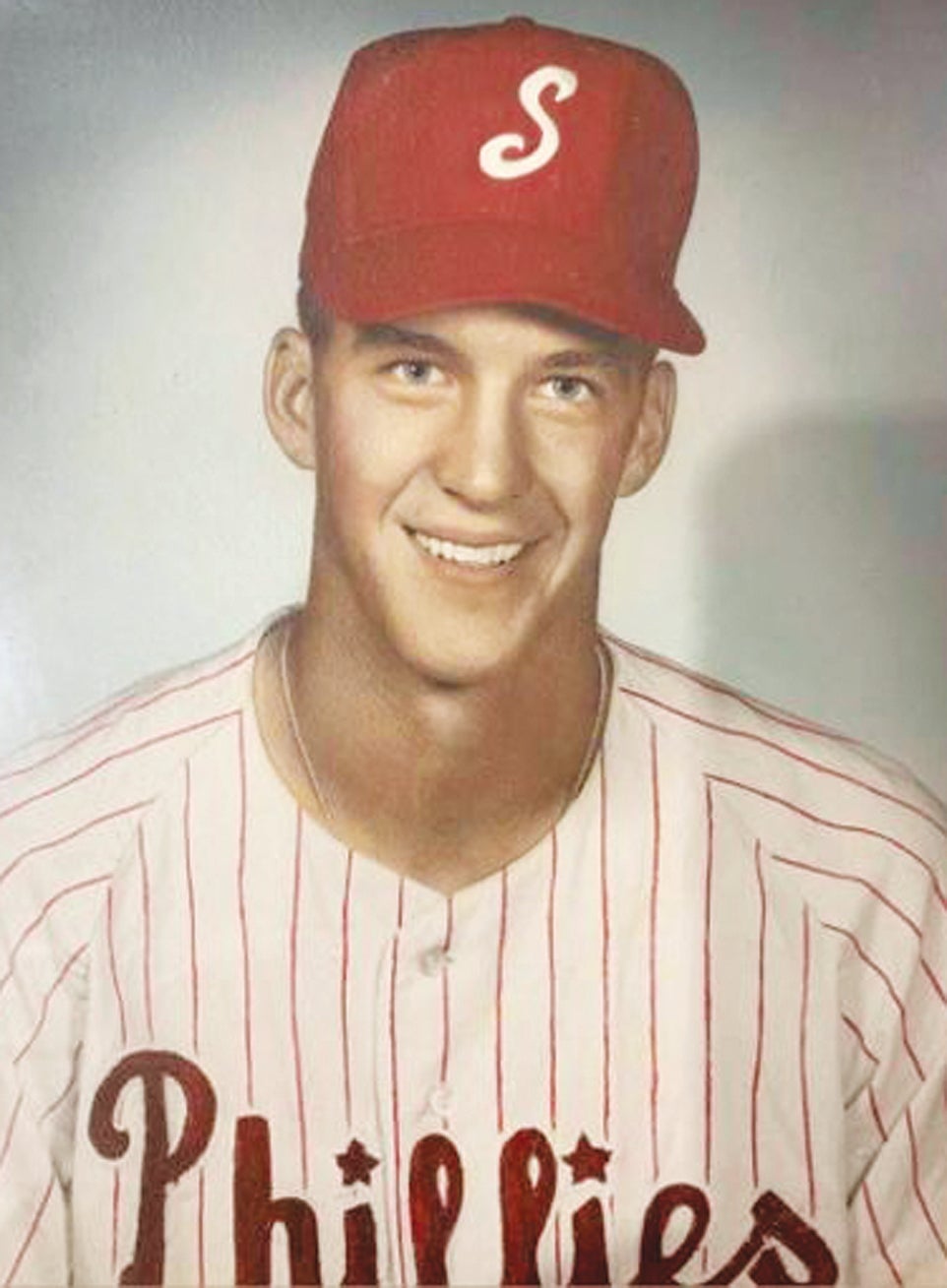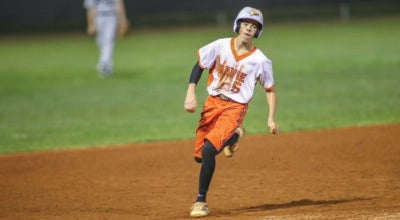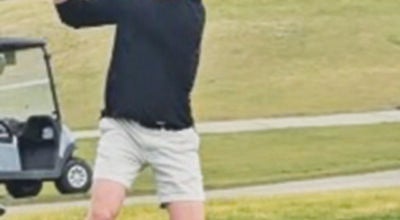Davie’s all-time best pitcher dead at age 74
Published 10:36 am Thursday, January 14, 2021
|
Getting your Trinity Audio player ready...
|
By Brian Pitts
Enterprise Record
Two of the most spectacular baseball talents Davie County has ever seen died in a span of three days.
Brack Bailey, who grew up in Advance and lived in Bermuda Run during his retirement years, passed away on Jan. 2 at age 83. John Parker, who grew up in Cooleemee and was living on Duke Street in Cooleemee, passed away on Jan. 4 at age 74.
Both are Davie County Athletic Hall of Famers, Parker getting named to the first class in 2002.
John Thomas Parker is the best pitcher in Davie High history with some space in between. He carried the Davie Rebels all the way in the 1965 Western North Carolina High School Activities Association playoffs, he was the Philadelphia Phillies’ second-round selection in the inaugural Major League Baseball draft in 1965 and he made the 40-man spring training roster four consecutive years before retiring in 1972.
“Big John” certified his Davie royalty on May 21, 1965. It was an incredible forever memory, Davie hosting Shelby with the WNCHSAA title on the line. The Golden Lions, the 1964 WNCHSAA champions, were undefeated. It’s hard to imagine how anyone could be better on the mound than Parker. Shelby countered with Billy Champion, who was as big in his world as Parker was in his. In the semifinals, Champion struck out 21 in a 4-0, 10-inning win at Hickory. Less than a month later, Parker and Champion were both drafted by the Phillies. Champion, selected in the third round, went on to pitch eight years in the major leagues.
“The road to Rich Park was dirt and we had to delay the game about 30 minutes so the dust could settle,” the late Bill Peeler, Davie’s baseball coach from 1957-70, said in 2002.
“When we were taking infield, we had to stop because we couldn’t see the ball,” Joe Mando, a 1965 freshman who started in center field, said in ‘02. “I’ve never seen a crowd (2,000-plus fans) like it. It was the darndest thing I’ve ever seen.”
Davie scratched out an unearned run in the bottom of the first inning. Earl Shoaf drew a leadoff walk. Gary Markland bounced back to the mound, but Champion’s throw to second was wild, the center fielder slipped as he tried to retrieve it and Shoaf scored.
That’s all the support Parker needed. Davie won an all-time classic 1-0. When the 39th out was in the books, the Rebels ran around in unrestrained joy and carried Peeler and Parker off the field. Shelby finished 12-1; Davie 13-3.
“All we heard was Billy Champion, Billy Champion,” Parker said in ‘02. “He could throw like a devil, boy. Shelby was a big school compared to Davie. That was a big thrill to win something like that. We came out in those ol’ baggy uniforms, they had those tight fittin’ ones and they looked at us and thought this is a piece of cake. It was one of those nights adrenaline and a little bit of talent helped out.”
Champion (6-foot-4, 188 pounds) hurled a two-hitter with 12 strikeouts and three walks, allowing singles to Shoaf and No. 9 batter Mando. Parker (6-5, 190) shoved a two-hitter with 14 Ks and zero walks. Three balls left the infield against Parker.
Peeler said: “The coach from Shelby before the game said: ‘I’ve heard a lot about your Parker boy. We’ll see how good he is against my 3-4-5 batters.’ Well, John struck them out nine times.”
Mando: “It was really something to be in the outfield and watch. I had a bird’s eye view to watch John pitch. We’d heard about Champion. The only thing I kept thinking was he can’t be any better than John.”
Parker: “Somebody told me there were like 10 or 12 college scouts and seven or eight pro scouts there.”
“You could see John rise to the occasion against Champion,” David Robertson, a 1966 Davie graduate who started two years at second base, said in ‘02. “They were expecting to take it. I’m telling you, Parker put on a show. Two pitchers of that caliber coming together in this part of the country, I’ve not seen it since.”
•••
Peeler knew he had someone special in his midst when Parker, as a freshman in 1962, held powerhouse Asheboro to one run over six innings. Davie lost in the last inning, 3-2.
Peeler: “The Asheboro coach said: ‘Is that kid a freshman?’ He couldn’t understand a kid that young throwing like he did. When we left, Asheboro was out there taking batting practice because it upset them that a 14-year-old set them down.”
During that sophomore year in 1963, Parker threw a no-hitter and struck out 15 in a three-hitter against Mooresville. With John and big brother Grimes Parker combining for an 11-0 record, Davie (13-2) clinched its first North Piedmont Conference title with three games to spare.
J. Parker was also a top-notch athlete in football and basketball. He started at varsity quarterback for two years and was all-NPC as a 1964 senior, when he led Davie to 7-3 and runner-up in the league. He made the all-NPC squad twice in basketball. The 6-5 center pounded Troutman with 33 points, and Davie captured the NPC title in 1963-64.
“If baseball hadn’t entered the picture, John would have been an excellent quarterback in college,” the late Jack Ward, Davie’s football coach from 1956-67, said in ‘02. “John was a little slow but he had natural ability. He was real hard-nosed, a real competitor and a good thrower. He threw a soft, easy ball to catch.”
•••
After enduring a series of low-scoring losses and going 6-5 in 1964, Parker tortured opponents as a senior. Younger generations might have trouble digesting this:
In two games against East Rowan, the 1964 NPC champion, Parker struck out 36. He had 17 Ks in one game against North Rowan. In a 4-0 no-hitter against Mooresville, he piled up 17 Ks and permitted three balls in fair territory. His first three starts were two no-hitters and a one-hitter. He allowed one baserunner in a 1-0 no-hitter over North Rowan. The one batter who reached? Parker picked him off before throwing the next pitch. Parker’s 3-0 no-hitter over Children’s Home spoiled Melvin Hughes’ three-hitter.
West Rowan put its ace, Randy Turman, and its 6-0 record on the line against Davie. Parker fanned 12 in a 1-0 Davie win. Robertson doubled twice and scored the only run in a game that lasted one hour, 10 minutes.
“I hated to hit against him because you didn’t get much batting practice,” Norman “Nemo” Woodward, a 1963 senior, said in ‘02. “And he would just sit out there and grin at you.”
Mando: “When we took batting practice, coach Peeler would have to tell John to slow down. You always knew unless one of us really messed up, we had a win. After the fact, I think we all would say you could have put John, a catcher and maybe one fielder out there, and that’s all you needed. He was just that dominant.”
Peeler: “John had a curveball that would drop off the table, he could throw a knuckle and he had perfect control. John was 6-5 and when he came off the mound, he was on top of you. In that day and time, you pitched seven innings on Tuesday and again on Friday. He was big and strong and his father (Grimes Parker Sr.) would say 14 innings is not much for a week. (Catcher) Ken Boger’s left hand would be an inch-and-a-half thicker after games.”
“When he had a real good curveball, he was almost unhittable,” Boger, a three-year starter and an all-NPC selection in 1965, said in ‘02. “It was a pleasure to catch him.”
“My favorite memory of John Parker was getting to catch him when he was warming up in the bullpen getting ready to pitch,” Dub Potts said last week. “My hand stayed swollen all spring during my sophomore year.”
Davie cemented its second NPC title in three years with two games left in the regular season. In the North-South Piedmont championship game, Parker blew away 13 batters and walked one as Davie defeated Albemarle 4-2. That set up the historic battle against Champion and Co.
“We would put a sponge inside the mitt, and my hand would still swell after a day or two,” Phil Peeler, Shelby’s catcher in 1965, told the Shelby Star in 2017. “(Champion) probably threw it 95-97 (mph) and was just so accurate. He also had a knuckleball you wouldn’t believe. Batters could not hit him.”
“(Champion) was one of the hardest-throwing pitchers to ever come through here,” Elmore Hill, a Gaston County Sports Hall of Famer, told the Shelby Star in ‘17.
Parker’s final numbers were mind-boggling. He went 11-0 in 11 starts. He struck out 156 and walked 25 in 82 2/3 innings. He gave up 23 hits and seven runs (five earned) for a 0.42 ERA. The all-state hurler finished his career with four no-hitters and six one-hitters.
Oh, yeah, in an American Legion doubleheader at Lexington in 1964, Parker won both games while throwing all 14 innings.
“You couldn’t imagine somebody as young as John was with that kind of control, and his fastball was 92 or 93 (mph),” the late Dan Marion, a 1965 senior, said in ‘02.
“John has a major league curveball right now,” Washington Senators scout Tex Millard said in 1965. “He’s potentially as fine a pitcher as a scout will see. He’s got all the ingredients of a future major leaguer.”
•••
The Phillies drafted Parker and Champion in June 1965 and both reportedly received signing bonuses of better than $10,000. They were sent to rookie league in Huron, S.D., and assigned to the Single-A Spartanburg Phillies in 1966.
“Momma (Hazel) packed all of his clothes and got everything ready for him,” John’s sister, Patty Lookabill, who passed away in 2017, said in ‘02. “In a week or so, he calls mother and tells her all his underwear is pink. She said: ‘Well, John, what’s wrong with your underwear?’ He said: ‘I don’t know.’ He had washed it with his shirts that had red sleeves, so he had to wear pink underwear with all those guys.”
The transition from high school to pro ball barely made him flinch. After having his 1966 season (2-0 record in three starts) interrupted by a military obligation as a member of the Army Reserves, Parker showed why the Phillies drafted him before a guy named Nolan Ryan.
In 1967, the righthander went 17-3 with a 1.76 ERA and 14 complete games for a Spartanburg team that won 25 straight and attracted more than 6,000 fans to some games. He was the Topps Player of the Month in May in the Western Carolinas League after starting 10-0 with eight complete games. Later, after Spartanburg finished a gaudy 80-43, Topps named him to the National All-Class A team as Pitcher of the Year.
He was on Philadelphia’s 40-man roster by age 20, and he beat Baltimore twice in spring training. There were no doubts.
“In spring training at Clearwater, Fl., Philadelphia manager Gene Mauch told Parker that he was the best young pitching prospect in the Phillie system,” Spartanburg President Pat Williams said in June 1967.
In a higher level of Single A for Portsmouth (Va.), Parker went 4-0 with a 1.93 ERA. After winning 26 of his first 29 decisions, he went 10-5 for the Portsmouth Tides. After getting traded to the Washington Senators organization, he went 7-1 as Burlington’s long reliever.
“I don’t choke when I get men on base,” Parker said then. “For example, at Gastonia, they got the bases loaded twice with no outs, but we beat them 1-0. I’ll have to admit that I am a little lucky, too.”
He was promoted to Triple A in 1969, going 4-2 for the Denver Bears. He made four spring training rosters, two each with the Phillies and Senators. He felt certain The Show was just around the corner.
Parker: “After the year I had in Spartanburg, the report on me was he needs to be in the major leagues. (Spartanburg manager) Dick Teed even told me that. (But Mauch and the Phillies blew a six-and-a-half game lead with 12 games left in 1964) because he brought up some Triple A guys. So Mauch was down on rookies.”
Parker climbed to the major-league doorstep time and again, but things didn’t turn out as planned. His arm ran out of juice and he retired in 1972.
“One step,” he said. “I had the key in the door but couldn’t get it unlocked. Cortisone shots here, cortisone shots there. They’d shoot you up before you pitched and that just doesn’t get it. I wish I hadn’t had so much arm trouble and a lot of other things wouldn’t have happened – but I thoroughly enjoyed it.
“I’d be nice to be 18 years old with the expansion teams. Back then there were eight in the American League and eight in the National League, and it was tough. They told us three out of 100 got to the big leagues. If I was 18 now – and I’m not a bragger, believe me I’m not – I could pitch in the (30-team) big leagues.”
Although Parker fell short of every ballplayer’s wildest dream, he enjoyed incredible moments with guys who became well known.
He used to carry Bill Madlock, a major leaguer from 1973-87, to and from the ballpark. He struck out Frank Howard, who played in the majors from 1958-73. He spent spring training with future Phillies great Ritchie Allen. Ted Williams, arguably the greatest hitter of all time, was the Senators’ manager when Parker played for their top farm team (Denver Bears). Art Fowler, manager Billy Martin’s pitching coach in Oakland and New York, was Parker’s pitching coach for two years. He had extended conversations with Bob Feller, who had six 20-win seasons. (Feller gave Parker a shirt with “Feller” on the back.) No shame here, but he gave up a mammoth homer to future Hall of Famer Mike Schmidt. He batted against Vida Blue, a 200-game winner. Bill White, who would become National League President, played a locker-room prank on Parker. He lost a Triple-A game 1-0 in the bottom of the ninth on a hit by Kurt Bevacqua, a major leaguer from 1971-85. He played with or against Carl Yastrzemski (major leaguer from 1961-83), John Vukavich (1970-81), Larry Bowa (1970-85), Bob Boone (1972-90), Dave Parker (1973-91) and Gene Tenace (1969-83).
Parker’s final pro stats over seven years: 46-36 record, 3.71 ERA, 26 complete games in 85 starts, 47 relief appearances, 621 innings, 604 hits, 241 walks and 450 strikeouts.
Marion: “He was definitely major league. I mean, you could see it. It was written all over him. If the Phillies wouldn’t have pitched him to death in his first two years and built his body, John would have gone on to the majors.”
“He had the size, the ability … He had it all,” said 1973 Davie graduate Russ Spry in ‘02. “With a few breaks, he was going all the way. In this day and time, he would have gone after half a year in Triple A, if not the big leagues.”




